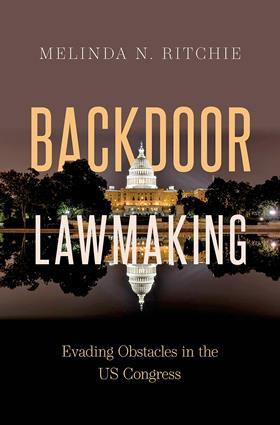Lawmaking in the shadow of Congress
Backdoor Lawmaking: Evading Obstacles in the US Congress
Melinda N. Ritchie
£19.99, Oxford University Press
★★★★✩
This book lifts the veil on one aspect of the reality of lawmaking in the US. This is a democracy which (unlike the UK) draws its inspiration from a full-blooded written constitution. However, the constraints of such a constitution have led to the use of informal back-channels between members of Congress and US federal agencies to ensure that certain specific policy initiatives are recognised and implemented.
To appreciate the significance of these back-channels (which the author also refers to as ‘inter-branch’ relations), the huge importance of the ‘separation of powers’ within the formal US constitutional framework needs to be understood. This is the notion that by keeping the legislative (Congress), executive (president) and judicial (Supreme Court) branches of government substantially separate, democracy is best served and the rule of law best facilitated.
However, through painstaking research (aided by the use of such tools as copious requests to federal agencies under the US Freedom of Information Act), the author demonstrates how members of Congress (quite legitimately it seems) seek to circumvent the formalities of the system by liaising with federal agencies to get policies addressed and decisions made. From the agencies’ standpoint, these liaisons are not necessarily unwelcome because it gives them access to the real world of lawmaking at its most fundamental level. One of the main reasons for all these liaisons is the often slow pace at which legislation proceeds through Congress with all the formalities that have to be gone through.

Melinda Ritchie’s book is interspersed with several examples of how ‘backdoor lawmaking’ works in practice. A particularly important example given is how legislators successfully lobbied the executive branch to use existing discretionary powers to protect child migrants to the US during the Obama administration, even in advance of more formal legislation or executive orders being made possible.
The book is divided into nine compact chapters and the research is backed up by numerous diagrams and charts (there are also detailed footnotes, references and an index).
The book’s ‘Conclusions’ reveal some unexpected explanations for why the use of back-channels for ‘backdoor lawmaking’ in the US is so prolific. There is no one overriding explanation for all these encounters but the author does build a mosaic of factors which, to use her words, ‘suggests powerful lawmakers and bureaucrats are shaping public policy in the shadow of the separation of powers’.
In the UK, we have our own version of the separation of powers as well as our own parliamentary back-channels. But perhaps they are less remarkable than those on which Ritchie has shone a light in the US because, with our common law–derived constitution, our whole system of government is more flexible anyway. Nevertheless, Ritchie’s book is an instructive read.
David Glass is a consultant solicitor at Excello Law































No comments yet